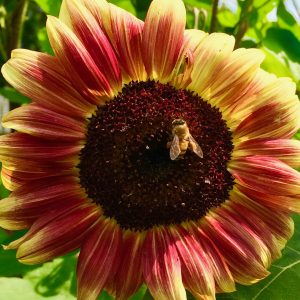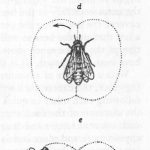 The honey bees were back in force this summer, especially in those early weeks when all the world was in fragrant flower. The last few years, their numbers had thinned— making us worry about colony collapse — but, like so many things in nature, their absence seems to have been just part of a larger cycle, at least in our neck of the woods. It’s such a joy to observe bees at their busyness — the meticulous combing of every pollen-dusted pistil, the hoovering across the seed-roughened face of a sun flower.
The honey bees were back in force this summer, especially in those early weeks when all the world was in fragrant flower. The last few years, their numbers had thinned— making us worry about colony collapse — but, like so many things in nature, their absence seems to have been just part of a larger cycle, at least in our neck of the woods. It’s such a joy to observe bees at their busyness — the meticulous combing of every pollen-dusted pistil, the hoovering across the seed-roughened face of a sun flower.
 Recently, we watched with a friend of ours as a whole army of honey bees swarmed over his late-flowering bamboo. He told us about a favorite book of his by Karl von Frisch, a Nobel-Prize-winning ethologist, called The Dancing Bee which describes the ways bees communicate with each other through various “dances.” The waggle dance shown on the left, is what the forager bee (the one who goes out to find sources of pollen) performs back in the hive to tell the others exactly where to find a new feeding place — often miles away.
Recently, we watched with a friend of ours as a whole army of honey bees swarmed over his late-flowering bamboo. He told us about a favorite book of his by Karl von Frisch, a Nobel-Prize-winning ethologist, called The Dancing Bee which describes the ways bees communicate with each other through various “dances.” The waggle dance shown on the left, is what the forager bee (the one who goes out to find sources of pollen) performs back in the hive to tell the others exactly where to find a new feeding place — often miles away.
Here’s a poem by the American poet and translater John Ciardi about bees as they go about their daily plundering of that most ephemeral of summer flowers.
Bees and Morning Glories
John Ciardi
Morning glories, pale as a mist drying,
made from the heat of the day, but already
hunchback bees in pirate pants and with peg-leg
hooks have found and are boarding them.
This could do for the sack of the imaginary
fleet. The raiders loot the galleons even as they
one by one vanish and leave still real
only what has been snatched out of the spell.
I’ve never seen bees more purposeful except
when the hive is threatened. They know
the good of it must be grabbed and hauled
before the whole feast wisps off.
They swarm in light and, fast, dive in,
then drone out, slow, their pantaloons heavy
with gold and sunlight. The line of them,
like thin smoke, wafts over the hedge.
And back again to find the fleet gone.
Well, they got this day’s good of it. Off
they cruise to what stays open longer.
Nothing green gives honey. And by now
you’d have to look twice to see more than green
where all those white sails trembled
when the world was misty and open
and the prize was there to be taken.





Happy to know the bee population seems to have rebounded in some places.
Thanks, Cheryl. Always great to hear from you!
Thanks for noticing and sharing the wonder of nature!
Thanks, Phyllis — the bees do so much to keep the world going in the right direction, just like you.
Lovely poem
I don’t know Ciardi’s work that well, but I really like his blend of easy formalism and dry wit. Hope all goes well with you as the summer (sigh) wanes.
Responding to this a little late, but wanted you to know I went to the New York Botanical Gardens yesterday, walked through the rose garden and watched many bees hitting on the roses! You made me more aware of them. Thank you.
Beata
Thank you, B — they’re ravaging my last few rose blooms in the Berkshires, too, as if there’s no tomorrow. Which, for them, is sadly the case!